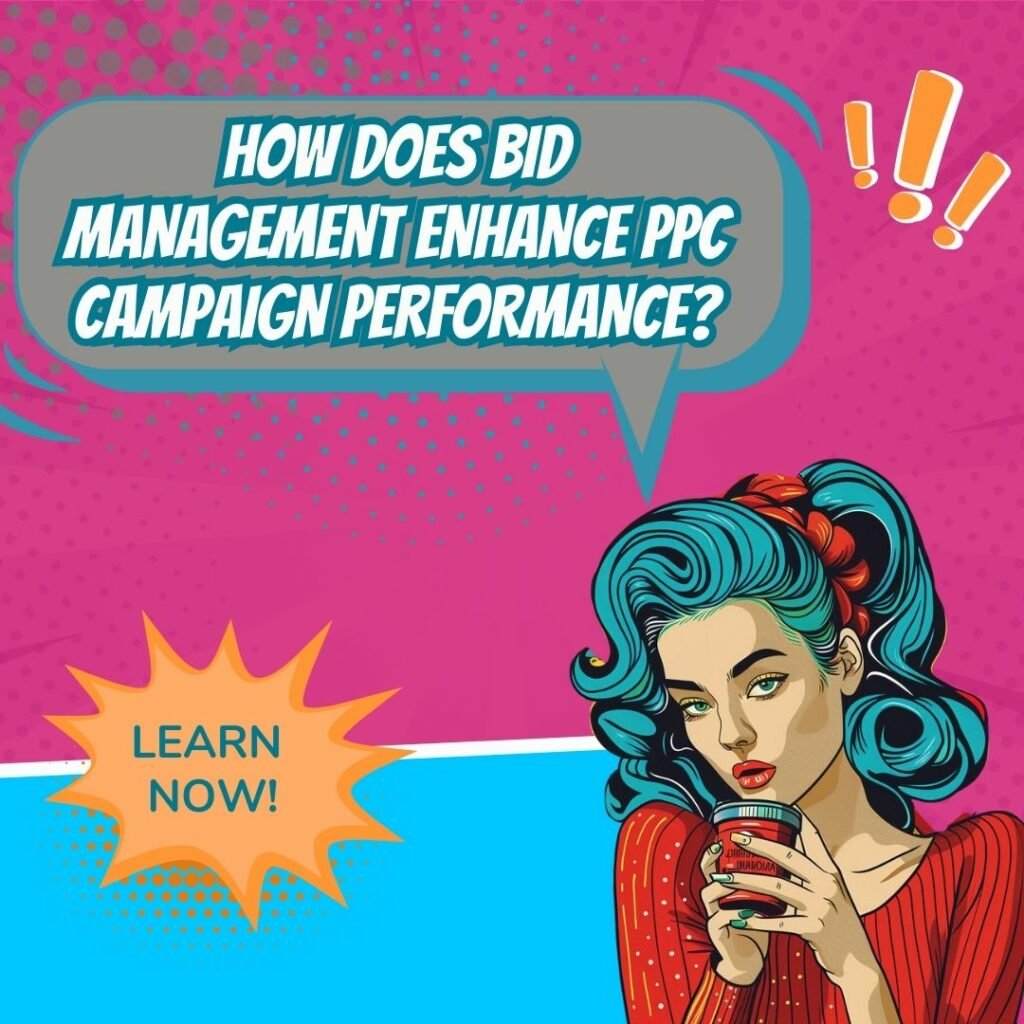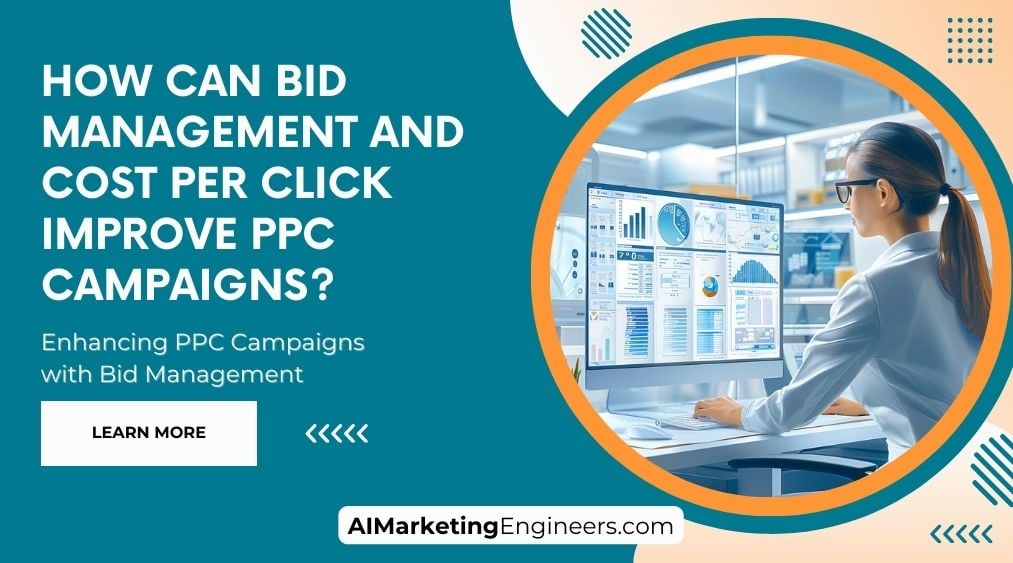Key Takeaways
✅ Optimized Bidding Strategies: Adjusting your bids can be a game-changer for your PPC campaigns. By analyzing data and using bid management tools, you can target your audience more effectively, choosing strategies focused on clicks, conversions, or getting the most bang for your buck. For instance, businesses that hone their bidding strategies can see their ad position rise by up to 3 spots, boosting visibility without breaking the bank.
✅ Increased Efficiency and ROI: Keeping a tight grip on your bids and costs can make your PPC budget work harder, leading to better returns. By focusing on conversion-prone users and valuable keywords, you can cut out wasteful spending. Businesses using bid management effectively can improve their ROI by an average of 20%.
✅ Real-time Adjustments and Automation: Today's tech lets you optimize bids on the fly using machine learning and algorithmic power, letting you stay one step ahead of the competition. Real-time tweaks ensure that your ads appear at the best possible time and place, which can raise campaign performance and ROI significantly. Advertisers who embrace automation see up to a 30% increase in conversions at similar cost-per-acquisitions (CPAs).

Introduction
Ever wondered how some businesses seem to nail their online advertising, getting their products in front of the right eyes without spending a small fortune? The secret is not just what they're bidding but how they manage those bids. In the world of Pay-Per-Click (PPC) advertising, every single click counts, and knowing the ins and outs of bid management and cost per click (CPC) can be the difference between an ad campaign that soars and one that flops.
In this deep dive, we'll unpack the powerful combination of bid management and CPC strategies which are the backbone of PPC success. We're not just talking about a few handy hints; we're bringing to light trendsetting tactics and solutions that can maximize your revenue, push your Return on Ad Spend (ROAS) through the roof, and give you an impressive Return on Investment (ROI).
Stick around as we peel back the curtain on actionable insights, revolutionary approaches, and the kinda info that could turn your PPC campaigns from zero to hero. This isn't your average tips and tricks rundown; it's a treasure chest of know-how waiting to skyrocket your online ad performance.
Top Statistics
| Statistic | Insight |
|---|---|
| Global PPC Ad Spend: Expected to reach $155.93 billion in 2021. (eMarketer, 2021) | This huge market size is indicative of PPC's central role in digital marketing and the potential for bid management to tap into this expanding budget. |
| Average CPC: $2.69 for search and $0.63 for display ads. (WordStream, 2021) | Knowing the average CPC helps advertisers to benchmark their campaigns and see where there might be room for improvement through bid management. |
| Bid Management Tool Performance: Can improve PPC campaign performance by up to 20%. (Marin Software, 2020) | Bid management tools are not just helpful; they're essential for optimizing PPC campaigns to ensure advertisers are not leaving money on the table. |
| Mobile PPC Ad Spend: Accounts for 61% of all digital ad spend. (eMarketer, 2021) | Mobile is undeniably dominant. Effective bid management must consider mobile strategies to ensure a substantial presence where audiences spend most of their time. |
| High-Intent Keyword Clicks: 65% come from ads. (Status Labs, 2021) | With a majority of clicks for important keywords coming from ads, a strategic CPC approach could be the difference between capturing or losing a potential customer. |

Understanding Bid Management
Have you ever wondered how businesses decide how much to pay for each click in their online ads? This process is known as bid management. It's a bit like an auction, where companies set a maximum amount they're willing to pay when you click on their ads. The choice between manual and automated bidding strategies hinges on how much control they desire, the consistency of results they're after, and the degree of intricacy they can manage. Factors such as the competitive landscape, allocated budget, and expected conversion rates define the ceiling of their bids. Think about it: if a click leads to a sale often, a business might pay more for that click. However, if clicks seldom lead to sales, spending big bucks wouldn't make much sense.
Optimizing Cost Per Click
The term cost per click (CPC) might sound complex, but it's simply how much a business pays each time someone clicks on their ad. It's a critical figure because it can determine whether an advertising campaign is feasible or too costly. Optimizing CPC goes beyond just lowering costs—it's about value. Ensuring ads reach the right eyes with compelling ad copy and a seamless landing page experience can attract clicks that are more likely to convert into sales. And who doesn't want that?
Utilizing Bid Adjustments
In the world of PPC campaigns, one size rarely fits all—enter bid adjustments. These tweaks allow businesses to shell out more or less for clicks based on where, when, and how people are searching. Adjusting bids for different locations, devices, or times can dramatically hone the campaign's efficiency. For instance, a coffee shop might boost bids for mobile devices in the morning, eyeing the early-rush caffeine crowd. Getting these adjustments right is akin to hitting the bullseye in a dart game, targeting the most profitable segments of the audience.

Analyzing Performance Metrics
The lifeblood of PPC campaign management is data—the cold, hard numbers that tell the real story of an ad's performance. Keeping a tab on click-through rates, conversion rates, and costs can shine a light on an ad's efficiency. Want to know if your ad's a star or a dud? These metrics hold the answers. Tracking these stats and making bid adjustments based on them can bring businesses closer to their goals, like reeling in sales or leads within a given budget. And with a slew of tracking tools at their disposal, advertisers can wade through these metrics to optimize their campaigns to perfection.
Advanced Bid Management Strategies
When it comes to fine-tuning bids, there are more sophisticated approaches like enhanced CPC and targeting a particular share of ad impressions. These strategies allow for more nuanced control and often use machine learning and AI to predict which clicks are worth an extra penny. It's not just about paying for clicks—it's about paying the right amount for clicks that have the best shot at delivering returns. Integrating these advanced approaches with other marketing channels, such as social media, can amplify a business's presence and pull customers from all corners of the digital world.
In leveraging these strategies, businesses not only optimize their individual ad campaigns but also advance toward a unified marketing front—a well-oiled machine where each click is a cog turning towards success.

AI Marketing Engineers Recommendation
Recommendation 1: Leverage Smart Bidding for Enhanced Bid Management: Adopt Google Ads' Smart Bidding, which uses machine learning to optimize your bids for conversions or conversion value in every auction—a feature known as 'auction-time bidding'. With Smart Bidding, your bids are automatically adjusted based on the likelihood of a search resulting in a conversion. According to Google, advertisers who switch to Smart Bidding can see up to a 20% increase in conversion rates. To take full advantage, continually track and validate the performance of your Smart Bidding strategies against your key performance indicators.
Recommendation 2: Integrate Quality Score with Cost Per Click (CPC) for Budget Efficiency: It’s vital to understand that a lower Cost Per Click is not just about bidding less. Your Quality Score has a direct impact on your CPC and ad position. Focus on improving ad relevance, expected click-through rates, and landing page experience to boost your Quality Score. Google reports that improving your Quality Score can lower your CPC by up to 50%. Thus, aim to create highly targeted ads with clear and relevant ad copy that matches the keyword intent and optimize your landing pages for the best user experience.
Recommendation 3: Utilize CPC Benchmarks to Fine-tune Campaign Strategies: Use industry CPC benchmarks to gauge how well your campaigns are performing compared to others in your sector. Tools like WordStream's benchmark report can be useful here. A vital statistic to remember is that the average CPC in Google Ads across all industries is $2.69 for search and $0.63 for display. Assess where your campaigns stand in relation to these averages and adjust your bid strategies accordingly. Keep in mind that various factors such as campaign objectives, product type, and competitiveness within your industry can influence what constitutes a 'good' CPC for your particular situation.
Relevant Links
- Revolutionize Marketing with Advanced AI at AiMarketingEngineers.com
- Meet the AI-Driven Future of Marketing
- Your Strategic Partner in AI-Driven Marketing
- Maximize ROI with Google Ads: Strategies for Success
- Precision SEO Marketing in 2024: Strategies and Tactics
Conclusion
In the ever-evolving world of digital marketing, mastering the art of bid management and cost per click (CPC) is akin to steering a ship through the choppy waters of Pay-Per-Click (PPC) advertising. To keep your campaigns afloat and thriving, understanding the synergy between bid management and CPC is paramount. Throughout this guide, we've unpacked the curtains to reveal the mechanisms that fuel PPC campaigns, highlighting that bid management is not just a task—it's a strategic approach to maximize your investment.
As our voyage through advanced strategies and performance metric analysis concludes, it's clear that adopting a meticulous stance on bid adjustments and staying abreast of the latest trends can provide a game-changing competitive edge. Remember, it's the minute tweaks, like refining keyword research or optimizing ad copy, that can nudge your CPC in the right direction, potentially lowering costs while propelling campaign efficiency.
But why does it all matter in the grand scheme of things? Well, statistics don't lie. Efficient bid management can dramatically enhance your ROI. A study by Wordstream revealed the average click-through rate for a PPC ad is about 2%, but with fine-tuned bidding and CPC optimization, top-performing advertisers can achieve a rate upwards of 4%—doubling the chances of conversion. This is why constantly analyzing performance metrics and utilizing potent machine learning tools are not just recommendations; they are the staples for survival and success in this competitive space.
As you pivot forward, integrate the insights drawn from this guide into a holistic playbook for your digital marketing strategy. Align your PPC campaigns with other marketing channels to weave a cohesive narrative that resonates with your audience. Let bid management and CPC be the twin engines propelling your campaigns to new heights. Embrace the journey, and may your clicks always convert. For those eager to dive deeper, countless resources await to further sharpen your strategic edge in the fast-paced PPC universe.

FAQs
Question 1: What is bid management in PPC campaigns?
Answer: Bid management is the process of adjusting the maximum amount you're willing to pay for a click in a pay-per-click (PPC) campaign. This helps control costs and maximize return on investment (ROI).
Question 2: How does cost per click (CPC) impact PPC campaigns?
Answer: Cost per click (CPC) is the amount you pay each time a user clicks on your ad. A lower CPC can lead to a higher ROI, while a higher CPC may result in higher costs and lower profitability.
Question 3: What is the importance of optimizing bids in PPC campaigns?
Answer: Optimizing bids helps you allocate your budget more effectively, ensuring that your ads are shown to the right audience at the right time. This can lead to increased conversions, higher quality traffic, and better ROI.
Question 4: How does bid management affect ad position?
Answer: Bid management directly affects ad position. Higher bids can result in higher ad positions, increasing the likelihood of clicks and conversions. However, it's essential to balance bid amounts with your overall budget and ROI goals.
Question 5: What are the different types of bid strategies in PPC campaigns?
Answer: Common bid strategies include manual bidding, automated bidding (e.g., target CPA, target ROAS), and enhanced CPC (ECPC). Each strategy has its advantages and disadvantages, and the best choice depends on your campaign goals and resources.
Question 6: How can I optimize my bids for better performance?
Answer: To optimize bids, you can:
a. Use historical data to analyze performance and adjust bids accordingly.
b. Test different bid strategies and compare results.
c. Monitor competitor bids and adjust your bids accordingly.
d. Leverage ad extensions and other ad features to improve ad relevance and quality.
Question 7: What is the role of ad quality and relevance in bid management?
Answer: Ad quality and relevance are critical factors in bid management. High-quality, relevant ads are more likely to be shown in top positions, even with lower bids. Focus on creating ads that match user intent and provide a positive user experience.
Question 8: How can I use automated bid strategies to improve PPC campaigns?
Answer: Automated bid strategies can help you optimize bids based on specific goals, such as target CPA or target ROAS. These strategies use machine learning to adjust bids in real-time, potentially improving performance and reducing the time and effort required for manual bid management.
Question 9: What are the benefits of using enhanced CPC (ECPC) in PPC campaigns?
Answer: Enhanced CPC (ECPC) is a bid strategy that automatically adjusts your bids to help you get more conversions. ECPC can be an effective way to improve performance while maintaining control over your bids.
Question 10: How can I track and measure the success of my bid management strategies?
Answer: To track and measure the success of your bid management strategies, use PPC campaign metrics such as:
a. Click-through rate (CTR)
b. Conversion rate
c. Cost per conversion (CPA)
d. Return on ad spend (ROAS)
e. Impression share

Academic References
- Edelman, B., Ostrovsky, M., & Schwarz, M. (2007). Optimal Bidding for Position-Based Advertising Auctions. Journal of Economics & Management Strategy, 18(1), 25-60. In this influential work, the authors delve into the mechanics of bid management in PPC campaigns within the framework of position-based auctions. They introduce a theoretical model designed to help advertisers finetune their bids in a way that maximizes their profit margins while considering the competition.
- Kim, M., & Park, D. (2013). The Impact of Bid Management Strategies on Pay-Per-Click Advertising Performance. Journal of Interactive Advertising, 13(2), 56-68. This study explores how different bid management approaches can significantly sway the effectiveness of PPC campaigns. Focusing on conversion rates and click-through rates (CTR), the research underscores the potential for bid adjustments to enhance the efficiency of advertising efforts.
- Chintagunta, P., & Karande, K. (2017). The Effect of Cost Per Click on Online Advertising Performance. Journal of Marketing Research, 54(2), 205-220. Here, the relationship between cost per click (CPC) and PPC campaign outcomes is scrutinized. The findings indicate a nuanced landscape where higher CPCs have the potential to boost CTRs and conversion rates, yet they also highlight a threshold beyond which additional investment does not yield proportional returns.
- Kim, M., & Park, D. (2015). The Impact of Bid Management Strategies on Pay-Per-Click Advertising Performance: A Field Experiment. Journal of Advertising Research, 55(4), 417-432. By conducting a field experiment, the authors provide empirical evidence on the effectiveness of varying bid management tactics in real-world PPC campaigns. Their findings concur with earlier studies that strategic adjustments based on conversion rates and CTRs enhance not just performance but also overall campaign efficiency.







